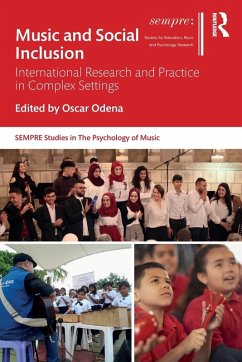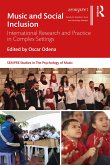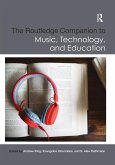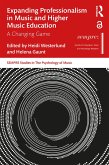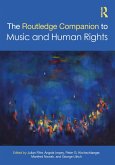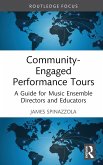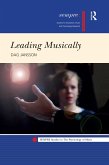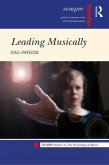Music and Social Inclusion
International Research and Practice in Complex Settings
Herausgeber: Odena, Oscar
Music and Social Inclusion
International Research and Practice in Complex Settings
Herausgeber: Odena, Oscar
- Broschiertes Buch
- Merkliste
- Auf die Merkliste
- Bewerten Bewerten
- Teilen
- Produkt teilen
- Produkterinnerung
- Produkterinnerung
The book celebrates the rich diversity of ways in which learners of all ages participate in social music projects in complex settings. Contributions focus broadly on musical and social processes, considering its conceptualization and practices in a number of contexts.
Andere Kunden interessierten sich auch für
![Music and Social Inclusion Music and Social Inclusion]() Music and Social Inclusion137,99 €
Music and Social Inclusion137,99 €![The Routledge Companion to Music, Technology, and Education The Routledge Companion to Music, Technology, and Education]() The Routledge Companion to Music, Technology, and Education64,99 €
The Routledge Companion to Music, Technology, and Education64,99 €![Expanding Professionalism in Music and Higher Music Education Expanding Professionalism in Music and Higher Music Education]() Expanding Professionalism in Music and Higher Music Education46,99 €
Expanding Professionalism in Music and Higher Music Education46,99 €![The Routledge Companion to Music and Human Rights The Routledge Companion to Music and Human Rights]() The Routledge Companion to Music and Human Rights227,99 €
The Routledge Companion to Music and Human Rights227,99 €![Community-Engaged Performance Tours Community-Engaged Performance Tours]() James SpinazzolaCommunity-Engaged Performance Tours68,99 €
James SpinazzolaCommunity-Engaged Performance Tours68,99 €![Leading Musically Leading Musically]() Dag JanssonLeading Musically50,99 €
Dag JanssonLeading Musically50,99 €![Leading Musically Leading Musically]() Dag JanssonLeading Musically143,99 €
Dag JanssonLeading Musically143,99 €-
-
-
The book celebrates the rich diversity of ways in which learners of all ages participate in social music projects in complex settings. Contributions focus broadly on musical and social processes, considering its conceptualization and practices in a number of contexts.
Produktdetails
- Produktdetails
- SEMPRE Studies in The Psychology of Music
- Verlag: Taylor & Francis Ltd
- Seitenzahl: 292
- Erscheinungstermin: 26. August 2024
- Englisch
- Abmessung: 234mm x 156mm x 16mm
- Gewicht: 454g
- ISBN-13: 9781032037202
- ISBN-10: 1032037202
- Artikelnr.: 71236657
- Herstellerkennzeichnung
- Libri GmbH
- Europaallee 1
- 36244 Bad Hersfeld
- gpsr@libri.de
- SEMPRE Studies in The Psychology of Music
- Verlag: Taylor & Francis Ltd
- Seitenzahl: 292
- Erscheinungstermin: 26. August 2024
- Englisch
- Abmessung: 234mm x 156mm x 16mm
- Gewicht: 454g
- ISBN-13: 9781032037202
- ISBN-10: 1032037202
- Artikelnr.: 71236657
- Herstellerkennzeichnung
- Libri GmbH
- Europaallee 1
- 36244 Bad Hersfeld
- gpsr@libri.de
Oscar Odena is Professor of Education at the School of Education and the School of Interdisciplinary Studies, University of Glasgow, UK. His areas of expertise comprise qualitative research approaches, inclusion, creativity, and music education. He has authored over 80 papers, and his monograph Musical Creativity Revisited was published by Routledge in 2018. He has been Principal Investigator in four projects on the role of the arts for inclusion and social cohesion. He serves on the boards of leading journals and the review colleges of the UK Arts and Humanities Research Council and Irish Research Council.
Introduction
Part I - Foundations
Chapter 1 - Exploring the order and disjuncture of music projects in places
affected by war, Gillian Howell
Chapter 2 - A model for developing music and music education activities for
social cohesion in complex settings, Oscar Odena
Part II - Cross-community environments
Chapter 3 - 'I just feel I belong here': homeless choirs and singing groups
in the UK and Brazil, Shelly Coyne and Raymond MacDonald
Chapter 4 - 'Participatory songwriting' as process/narrative: insights from
a community music project with diverse communities in the north east of
England, Sam Slatcher
Chapter 5 - Playlists, connection and covid: making sense of lockdown and
loss with songs in Mexico City and Glasgow, Valeria Gascón
Chapter 6 - What are the landmarks in a community music project? The case
of the Kithara project, Daniel Mateos-Moreno
Chapter 7 - The impact of music education in social projects: two cases in
south Brazil, Sergio Figueiredo and Oscar Odena
Chapter 8 - Crescendo: using a music education programme to improve social
outcomes in disadvantaged communities, Conneth Poland, Liam O'Hare and
Leeanne O'Hara
Chapter 9 - Does the 21st century music curriculum enable Northern
Ireland's children sing each other's songs?, Jenny Scharf and Oscar Odena
Chapter 10 - There is no global justice without global cognitive justice:
envisioning music education through the ecology of knowledges in the
context of Mexico, Hector Vázquez-Córdoba
Part III - Conflict and post-conflict environments
Chapter 11 - The art of positive fatalism, Lukas Pairon
Chapter 12 - Arts for peace education in Chihuahua, Mexico: efforts,
outcomes and challenges of two community music programs, Patricia A.
González-Moreno and Rubén Carrillo
Chapter 13 - Conflict transformation, scalability and the non-governmental
ear in a hip-hop social project in Iztapalapa, Mexico City, Andrew Green
Chapter 14 - Expedición sensorial programme: transformations in the role of
cultural policies in peacebuilding in Colombia, Andrea Rodríguez-Sánchez
and Gloria Zapata-Restrepo
Chapter 15 - Using sound ethnography to study a social music programme in
Colombia, Andrea Rodríguez-Sánchez, Oscar Odena and Alberto Cabedo-Mas
Chapter 16 - Every voice counts: the Listening Guide Method as a
methodology to analyse musical and political identities of FARC
ex-combatant musicians, Santiago Niño Morales and Raymond Macdonald
Afterword. Beyond inclusion, Geoff Baker
Part I - Foundations
Chapter 1 - Exploring the order and disjuncture of music projects in places
affected by war, Gillian Howell
Chapter 2 - A model for developing music and music education activities for
social cohesion in complex settings, Oscar Odena
Part II - Cross-community environments
Chapter 3 - 'I just feel I belong here': homeless choirs and singing groups
in the UK and Brazil, Shelly Coyne and Raymond MacDonald
Chapter 4 - 'Participatory songwriting' as process/narrative: insights from
a community music project with diverse communities in the north east of
England, Sam Slatcher
Chapter 5 - Playlists, connection and covid: making sense of lockdown and
loss with songs in Mexico City and Glasgow, Valeria Gascón
Chapter 6 - What are the landmarks in a community music project? The case
of the Kithara project, Daniel Mateos-Moreno
Chapter 7 - The impact of music education in social projects: two cases in
south Brazil, Sergio Figueiredo and Oscar Odena
Chapter 8 - Crescendo: using a music education programme to improve social
outcomes in disadvantaged communities, Conneth Poland, Liam O'Hare and
Leeanne O'Hara
Chapter 9 - Does the 21st century music curriculum enable Northern
Ireland's children sing each other's songs?, Jenny Scharf and Oscar Odena
Chapter 10 - There is no global justice without global cognitive justice:
envisioning music education through the ecology of knowledges in the
context of Mexico, Hector Vázquez-Córdoba
Part III - Conflict and post-conflict environments
Chapter 11 - The art of positive fatalism, Lukas Pairon
Chapter 12 - Arts for peace education in Chihuahua, Mexico: efforts,
outcomes and challenges of two community music programs, Patricia A.
González-Moreno and Rubén Carrillo
Chapter 13 - Conflict transformation, scalability and the non-governmental
ear in a hip-hop social project in Iztapalapa, Mexico City, Andrew Green
Chapter 14 - Expedición sensorial programme: transformations in the role of
cultural policies in peacebuilding in Colombia, Andrea Rodríguez-Sánchez
and Gloria Zapata-Restrepo
Chapter 15 - Using sound ethnography to study a social music programme in
Colombia, Andrea Rodríguez-Sánchez, Oscar Odena and Alberto Cabedo-Mas
Chapter 16 - Every voice counts: the Listening Guide Method as a
methodology to analyse musical and political identities of FARC
ex-combatant musicians, Santiago Niño Morales and Raymond Macdonald
Afterword. Beyond inclusion, Geoff Baker
Introduction
Part I - Foundations
Chapter 1 - Exploring the order and disjuncture of music projects in places
affected by war, Gillian Howell
Chapter 2 - A model for developing music and music education activities for
social cohesion in complex settings, Oscar Odena
Part II - Cross-community environments
Chapter 3 - 'I just feel I belong here': homeless choirs and singing groups
in the UK and Brazil, Shelly Coyne and Raymond MacDonald
Chapter 4 - 'Participatory songwriting' as process/narrative: insights from
a community music project with diverse communities in the north east of
England, Sam Slatcher
Chapter 5 - Playlists, connection and covid: making sense of lockdown and
loss with songs in Mexico City and Glasgow, Valeria Gascón
Chapter 6 - What are the landmarks in a community music project? The case
of the Kithara project, Daniel Mateos-Moreno
Chapter 7 - The impact of music education in social projects: two cases in
south Brazil, Sergio Figueiredo and Oscar Odena
Chapter 8 - Crescendo: using a music education programme to improve social
outcomes in disadvantaged communities, Conneth Poland, Liam O'Hare and
Leeanne O'Hara
Chapter 9 - Does the 21st century music curriculum enable Northern
Ireland's children sing each other's songs?, Jenny Scharf and Oscar Odena
Chapter 10 - There is no global justice without global cognitive justice:
envisioning music education through the ecology of knowledges in the
context of Mexico, Hector Vázquez-Córdoba
Part III - Conflict and post-conflict environments
Chapter 11 - The art of positive fatalism, Lukas Pairon
Chapter 12 - Arts for peace education in Chihuahua, Mexico: efforts,
outcomes and challenges of two community music programs, Patricia A.
González-Moreno and Rubén Carrillo
Chapter 13 - Conflict transformation, scalability and the non-governmental
ear in a hip-hop social project in Iztapalapa, Mexico City, Andrew Green
Chapter 14 - Expedición sensorial programme: transformations in the role of
cultural policies in peacebuilding in Colombia, Andrea Rodríguez-Sánchez
and Gloria Zapata-Restrepo
Chapter 15 - Using sound ethnography to study a social music programme in
Colombia, Andrea Rodríguez-Sánchez, Oscar Odena and Alberto Cabedo-Mas
Chapter 16 - Every voice counts: the Listening Guide Method as a
methodology to analyse musical and political identities of FARC
ex-combatant musicians, Santiago Niño Morales and Raymond Macdonald
Afterword. Beyond inclusion, Geoff Baker
Part I - Foundations
Chapter 1 - Exploring the order and disjuncture of music projects in places
affected by war, Gillian Howell
Chapter 2 - A model for developing music and music education activities for
social cohesion in complex settings, Oscar Odena
Part II - Cross-community environments
Chapter 3 - 'I just feel I belong here': homeless choirs and singing groups
in the UK and Brazil, Shelly Coyne and Raymond MacDonald
Chapter 4 - 'Participatory songwriting' as process/narrative: insights from
a community music project with diverse communities in the north east of
England, Sam Slatcher
Chapter 5 - Playlists, connection and covid: making sense of lockdown and
loss with songs in Mexico City and Glasgow, Valeria Gascón
Chapter 6 - What are the landmarks in a community music project? The case
of the Kithara project, Daniel Mateos-Moreno
Chapter 7 - The impact of music education in social projects: two cases in
south Brazil, Sergio Figueiredo and Oscar Odena
Chapter 8 - Crescendo: using a music education programme to improve social
outcomes in disadvantaged communities, Conneth Poland, Liam O'Hare and
Leeanne O'Hara
Chapter 9 - Does the 21st century music curriculum enable Northern
Ireland's children sing each other's songs?, Jenny Scharf and Oscar Odena
Chapter 10 - There is no global justice without global cognitive justice:
envisioning music education through the ecology of knowledges in the
context of Mexico, Hector Vázquez-Córdoba
Part III - Conflict and post-conflict environments
Chapter 11 - The art of positive fatalism, Lukas Pairon
Chapter 12 - Arts for peace education in Chihuahua, Mexico: efforts,
outcomes and challenges of two community music programs, Patricia A.
González-Moreno and Rubén Carrillo
Chapter 13 - Conflict transformation, scalability and the non-governmental
ear in a hip-hop social project in Iztapalapa, Mexico City, Andrew Green
Chapter 14 - Expedición sensorial programme: transformations in the role of
cultural policies in peacebuilding in Colombia, Andrea Rodríguez-Sánchez
and Gloria Zapata-Restrepo
Chapter 15 - Using sound ethnography to study a social music programme in
Colombia, Andrea Rodríguez-Sánchez, Oscar Odena and Alberto Cabedo-Mas
Chapter 16 - Every voice counts: the Listening Guide Method as a
methodology to analyse musical and political identities of FARC
ex-combatant musicians, Santiago Niño Morales and Raymond Macdonald
Afterword. Beyond inclusion, Geoff Baker

